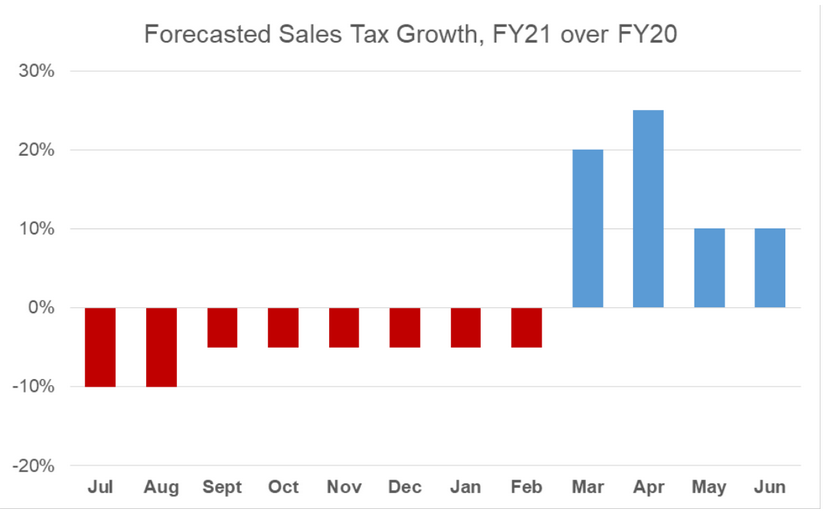Asheville City Council may not know what the future holds, but for the next fiscal year, it’s preparing for the worst. At a May 26 meeting — conducted virtually due to COVID-19 — city staff presented a bare-bones continuation budget aimed at limiting the impacts of the pandemic across city services.
“Honestly, this was not the budget I or we were hoping to present this year,” said Debra Campbell, Asheville’s city manager. “But under the circumstances, I think we are presenting a budget that addresses key service and Council priorities.”
Campbell’s total fiscal 2020-21 budget proposal stands at $184.6 million, a 3% decrease from last year’s total of $190.3 million, and would continue funding for existing services while limiting new programs, service enhancements and initiatives. The property tax rate would remain the same under the proposal, and no fee increases are recommended.
The city will also enter next fiscal year from a weaker position than previously anticipated. Barbara Whitehorn, the city’s chief financial officer, reported that Asheville expected to receive $1.6 million less in sales tax than budgeted for the current fiscal year, a drop of about 5.8%. Asheville is also forgoing $500,000 a month in parking revenues and roughly $56,000 monthly in transit fares by making those services free in response to the pandemic.
State and federal assistance is helping to pay for unanticipated expenses related to COVID-19, Whitehorn noted. But she said the city will still need to dip into its reserves to make up the lost revenue, spending up to $4.5 million for the general fund and $1.4 million for parking services. The year-end general fund balance could dip as low as 14% of revenues, beneath Council’s policy target of 15%.
Next year, Whitehorn said, the general fund balance is projected to take an additional $1.5 million hit as overall expenditures grow to $134.6 million, up 1.7% from the current fiscal year. She explained that the additional spending is primarily driven by the continuation of transit enhancements that went into effect in January.
Some of the city’s enterprise funds, in contrast, will see budget reductions. Due to a legal settlement, Asheville will discontinue the water capital improvement fee, resulting in approximately $7.4 million (18.3%) less revenue than last year for the Water Resources Fund. The parking services budget is projected to drop by roughly $520,000 (7%), and the Harrah’s Cherokee Center — Asheville will see a decrease of about $1 million (21.5%); Whitehorn attributed both reductions to COVID-19 impacts.
No new capital projects are included in the budget. Annual capital fund allocations will continue, and projects currently in progress, associated with grant funding or funded through the general obligation bonds approved in 2016 will continue.
Campbell’s proposed budget does not include a general wage increase for employees for the first time since the end of the 2008 recession. The city will, however, set a $31,200 (equivalent to $15 per hour) annual pay minimum for employees working 40 hours a week and fund a state-mandated local government employment retirement system increase of roughly $837,000.
But Asheville does not have the funding to address recommendations from a recent compensation study regarding all employees’ base pay, Whitehorn said. This includes any changes for firefighters, who work considerably longer hours than most other employees and can thus make less than $15 hourly.
The current firefighter pay plan sets annual trainee pay at $32,630, firefighter starting pay at $33,935 and senior firefighter pay at $40,603. Firefighter pay is being evaluated by the consultants working on the citywide compensation plan, Whitehorn explained.
A city hiring freeze enacted in the wake of COVID-19 will continue through at least the first six months of the new fiscal year. But because the crisis is creating more work for Asheville’s existing staff, Whitehorn noted, staff cuts are not recommended at this time. Contingency plans have been established in the event that deeper cuts or different service levels are necessary.
“There aren’t things we want to do, but the reality is that we need to plan for them just in case,” Whitehorn said.
Despite the general austerity, three new items are proposed in the fiscal 2020-21 budget: an after-school program coordinator for Asheville City Schools, extended hours and summer youth programming for city community centers and funding for the nonprofit Pisgah Legal Services Tenant Eviction Response team. The total cost of $93,000 will be reallocated from the city’s $242,000 Strategic Partnership Fund budget, leaving $149,000 to be distributed through the usual competitive grant process.
“There is ongoing major uncertainty,” Campbell said. “We do not know what the future may bring. However, we think we are prepared to respond.”
Council will hear public comments about the budget on Tuesday, June 9. Comment is currently being accepted by email at AshevilleCityCouncilJune92020@publicinput.com and voicemail at 855-925-2801, meeting code 8958. Council’s vote on the budget is scheduled for Tuesday, June 23.



” But because the crisis is creating more work for Asheville’s existing staff, Whitehorn noted, staff cuts are not recommended at this time”.
It is absolutely impossible that this is true across the board. The lack of scrutiny of costs when all constituents are having to sharpen the pencil is absurd.
What are the city’s parking management folks doing in the no parking fee era?